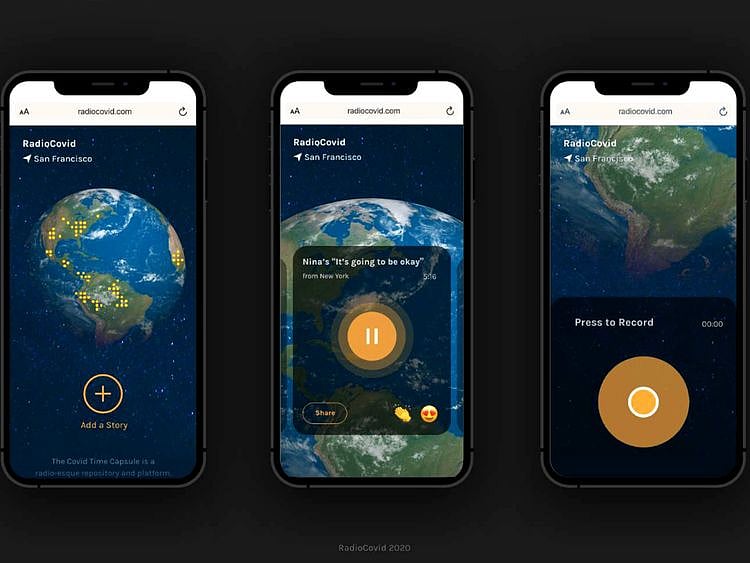Here are some examples of how design students and professors are thinking out of the box to mitigate the collateral risks of COVID-19.
In March, Global Grad Show, the Dubai-based not-for-profit initiative that works with the next generation of innovators from across the world, launched an open call to its global academic network looking for solutions to the issues arising from COVID-19.
The open call received applications from students and professors across 125 universities and 40 countries. The proposals engaged disciplines varying from medical engineering to game design and focused on issues ranging from disease detection and prevention to protecting the community’s most vulnerable.
Here are some proposals aimed at nurturing social and emotional well-being in times when we can’t physically be together.
RADIO COVID — ALONE TOGETHER
Elderly communities are among the most affected both physically and emotionally by coronavirus. Project Radio Covid, developed by Debanjana Saha, Jinal Mehta, Luyan Li and Shivani Singh from California College of Arts creates a voice platform where senior citizens can share their current experiences with others, through a simple and intuitive voice memo interface. It serves as an outlet for the current traumas and a learning tool for the future, mapping the difficulties faced by the older population.
TOUCH TIME
Studies show that viruses can stay on surfaces for several days depending on the material. To safely consume objects that can’t be disinfected (some food items, paper, electronics, etc), project Touch Time proposes smart NFC tags are attached to products brought from outside the house. Users then use an app to scan the tag and monitor, based on the date of delivery, when the item is deemed safe, after its own quarantine. Touch Time is a project by Tehran University student Sara Kashfi.
ECHOO
One of public transport’s social effects is that it increases people’s tolerance for sharing spaces. How may this be affected in a post-isolation period? Developed by Design Incubation Centre at the National University of Singapore, Project Echoo explores the use of headsets as a socialising tool, once public transport is safe again. To ease a transition back to close proximity situations, it uses existing Bluetooth features to lower music levels and encourage interaction with the environment and people around the user.
COCO
The need for self-isolation is forcing families with children to re-imagine their daily routine and come up with new ways to punctuate the passing days. Coco, the brainchild of Pauline Hanouzet from the L’Ecole de Design Nantes Atlantique, a weekly logbook and magazine, enables activity and task planning, allowing parents to keep their children entertained in a organised way, whilst discussing topics surrounding the pandemic in a child-appropriate way.
STORIES WITHIN
Currently emptied of people, neighbourhoods are an essential part of community life and sense of belonging. Developed by team Sociality from the Parsons School of Design (the New School), Stories Within is a digital platform that encourages people to share audio stories related to specific locations in a neighbourhood, mapped onto a VR setting. It proposes the use of storytelling to keep neighbours connected and allows the virtual exploration of new places through someone else’s personal stories.
COOKIN
Restaurants are among the business suffering the most from the impact of social distancing. CookIn is a virtual system that allows restaurants to share their recipes through a real-time video session with home chefs. Users will register, pay for the experience and receive a package of supplies to carry out the simultaneous preparation of a meal with the chosen restaurant. Cookin is a proposal by Natalia Reyes from the Tecnologico de Monterrey, Mexico.
NEST
The social distancing measures currently in place worldwide require new ways of thinking about travel and adventures. Developed by industrial designer Sebastian Maluska from the ECAL/University of Art and Design Lausanne, Nest is a modular tent solution to be attached to cars in order to create a sleeping pod and allow travelling with minimum social interaction.
Sign up for the Daily Briefing
Get the latest news and updates straight to your inbox
Network Links
GN StoreDownload our app
© Al Nisr Publishing LLC 2026. All rights reserved.
